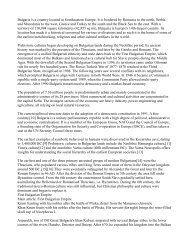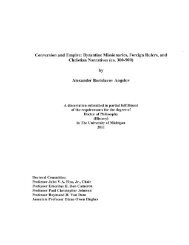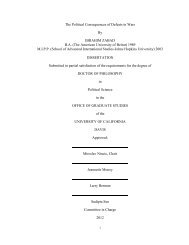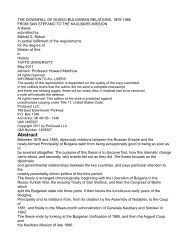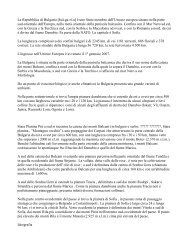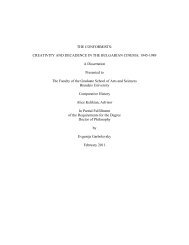- Page 1 and 2: IDENTITY, NATIONALISM AND CULTURAL
- Page 3 and 4: © 2011 Fatme M. Myuhtar-May ALL RI
- Page 5 and 6: A striking example of a Pomak tradi
- Page 7 and 8: esearch. They served as my gracious
- Page 9 and 10: 2. The Pokrastvane ................
- Page 11 and 12: Salih Aga and His Time ............
- Page 13 and 14: LIST OF TABLES Table 3-1. Number of
- Page 15 and 16: 5-12: Bride Kadrie Kadieva ........
- Page 17 and 18: FOREWORD The collapse of the mediev
- Page 19 and 20: (religious leadership) was still su
- Page 21 and 22: in the heart of Balkan Turkey. Thus
- Page 23 and 24: agreement. This uncertain and compl
- Page 25 and 26: CHAPTER I INTRODUCTION: CONTESTED I
- Page 27 and 28: contested, threatened heritage. By
- Page 29 and 30: anchors of memory (authentication);
- Page 31 and 32: - these Melungeon activists have el
- Page 33 and 34: and continuously (re)imagined as an
- Page 35: numerous Pomaks who suffered politi
- Page 39 and 40: CHAPTER II NATIONALISM OF COERSION:
- Page 41 and 42: (such as John Locke) held the right
- Page 43 and 44: fulfillment of a national state of
- Page 45 and 46: that while the concept of nation-st
- Page 47 and 48: crucial period, when the nascent Bu
- Page 49 and 50: a cultural image of their own becau
- Page 51 and 52: subject of rather emotional interpr
- Page 53 and 54: after the Balkan Wars. Complicit wi
- Page 55 and 56: Serbs did not consider themselves t
- Page 57 and 58: priest, and teachers who were part
- Page 59 and 60: 1912 and September 1913, the advanc
- Page 61 and 62: [T]he Pomak population continues to
- Page 63 and 64: in the Rhodopes, Thrace, and Macedo
- Page 65 and 66: Pomak dignitaries from neighboring
- Page 67 and 68: Ultimately, the Christianization of
- Page 69 and 70: Figure 2-3: Pokrastvane in the vill
- Page 71 and 72: 2.1. The Killings in Oral History C
- Page 73 and 74: he dealt a kick to the face of the
- Page 75 and 76: Figure 2-6: A commemorative marble
- Page 77 and 78: themselves out of the ditch and to
- Page 79 and 80: Christians of Slavic (Bulgarian) de
- Page 81 and 82: entering the village, the Serbian a
- Page 83 and 84: emember where you lived?’ ‘I do
- Page 85 and 86: her family, but all she remembered
- Page 87 and 88:
however, spared Mustafa Barutev’s
- Page 89 and 90:
To obtain release, Muslim POWs peti
- Page 91 and 92:
convert if “their sons, husbands,
- Page 93 and 94:
Further, a protocol of the Holy Syn
- Page 95 and 96:
civilian aides carried out the pokr
- Page 97 and 98:
evoked and relieved of their duties
- Page 99 and 100:
groups; and the more closely affili
- Page 101 and 102:
The revival process was the last fo
- Page 103 and 104:
this distinctiveness alone was goin
- Page 105 and 106:
Pre-communist Bulgaria was a turbul
- Page 107 and 108:
Apparently, the government first en
- Page 109 and 110:
The communist leadership’s last f
- Page 111 and 112:
shrewd leadership of the communist
- Page 113 and 114:
conceivable document. Those lacking
- Page 115 and 116:
assumed purpose of the question or
- Page 117 and 118:
one. In other words, more members o
- Page 119 and 120:
culture.” 41 That is why culture
- Page 121 and 122:
political and national unit. During
- Page 123 and 124:
concealed, negative attitude of the
- Page 125 and 126:
group, nor sufficiently different a
- Page 127 and 128:
only pushes the national sentiment
- Page 129 and 130:
equired by law to look after the in
- Page 131 and 132:
was overwhelmingly peasant. There w
- Page 133 and 134:
party’s stance about Organization
- Page 135 and 136:
Last night we organized groups with
- Page 137 and 138:
women /mostly old ones/ still stick
- Page 139 and 140:
for me]. I believe that every citiz
- Page 141 and 142:
‣ to persuade the Pomaks of an an
- Page 143 and 144:
mock court trials to frighten the w
- Page 145 and 146:
Ninth, whereas Pomaks who resisted
- Page 147 and 148:
and in most Pomak villages, the com
- Page 149 and 150:
a fierce resistance to the revival
- Page 151 and 152:
Kornitsa on an impromptu stretcher
- Page 153 and 154:
nobody rename us.” This tense sta
- Page 155 and 156:
However, the majority of Pomak stud
- Page 157 and 158:
If the letter is authentic, it posi
- Page 159 and 160:
ethnic Turks of 1984-1985 created a
- Page 161 and 162:
When Zhivkov promised to let all Mu
- Page 163 and 164:
and respect for the religious belie
- Page 165 and 166:
training Janissaries” and sending
- Page 167 and 168:
Potentially, people’s realization
- Page 169 and 170:
I met Ramadan in May 2007 while in
- Page 171 and 172:
anguish of one man’s life. He sto
- Page 173 and 174:
forced to formally renounce their I
- Page 175 and 176:
having witnessed the pre-communist
- Page 177 and 178:
As a member of the communist party,
- Page 179 and 180:
ain. 18 It was a group of these ref
- Page 181 and 182:
Whereas most ordinary people, espec
- Page 183 and 184:
in the factory and they are getting
- Page 185 and 186:
a different story to tell. “They
- Page 187 and 188:
eaten into signing declaration to c
- Page 189 and 190:
slept in shifts: while some slept,
- Page 191 and 192:
seemed to me like—a whole crowd -
- Page 193 and 194:
prisoners in Stara Zagora (a city i
- Page 195 and 196:
containers. They had not found anyt
- Page 197 and 198:
calling: “Get me out! Get me out
- Page 199 and 200:
emembered the last forced conversio
- Page 201 and 202:
Conclusion The last decade of commu
- Page 203 and 204:
group of 170 people collectively de
- Page 205 and 206:
on the farm, served largely by blac
- Page 207 and 208:
etween the wedding traditions of Ri
- Page 209 and 210:
Rhodopes, barely an hour away from
- Page 211 and 212:
I returned to Ribnovo in early 2009
- Page 213 and 214:
When bTV, a leading television medi
- Page 215 and 216:
keeping with age-old traditions whe
- Page 217 and 218:
the form of food, money, and variou
- Page 219 and 220:
While wearing the make-up, she keep
- Page 221 and 222:
interpret the elaborate “veiling
- Page 223 and 224:
Pomak traditions were altogether di
- Page 225 and 226:
Figure 5-16: Wedding Figure of 5-0-
- Page 227 and 228:
As the above oral and photographic
- Page 229 and 230:
Figure 5-26: Veiling the bride - St
- Page 231 and 232:
Like the mask and bridal attire, th
- Page 233 and 234:
Figure 5-31: Cheiz III Refrigerator
- Page 235 and 236:
✔Communal feasting is a vital com
- Page 237 and 238:
observable in Delta Wedding, howeve
- Page 239 and 240:
The authors contend that all humans
- Page 241 and 242:
Indeed, the passage from one stage
- Page 243 and 244:
wedding rite. This is clearly indic
- Page 245 and 246:
As documentary producers, journalis
- Page 247 and 248:
freedom. Of course, there never was
- Page 249 and 250:
wedding provides them with an oppor
- Page 251 and 252:
Mountains. What the people of Ribno
- Page 253 and 254:
The fundamental unifying characteri
- Page 255 and 256:
just awakening to the process of sh
- Page 257 and 258:
Muslim population of the Rhodopes,
- Page 259 and 260:
size of this one and destroyed in 1
- Page 261 and 262:
Whereas his rather independent rule
- Page 263 and 264:
into ashes, took property, women an
- Page 265 and 266:
Figure 6-3: The Smolyan Waterfall,
- Page 267 and 268:
early as the 1890s. Unfortunately,
- Page 269 and 270:
The works of Dechov, Haytov, and Ma
- Page 271 and 272:
site is occupied by the old army co
- Page 273 and 274:
Salih’s Family Tree Salih Aga was
- Page 275 and 276:
Raykovo [now a Smolyan’s suburb]
- Page 277 and 278:
Figure 6-8: Inscribed metal dish A
- Page 279 and 280:
ut in the konak only my wife’s or
- Page 281 and 282:
One day, Sofa, who took care of Adj
- Page 283 and 284:
horse and rider collapsed into the
- Page 285 and 286:
Atanass P. Raychev from Paşmaklı
- Page 287 and 288:
Figure 6-11: Scene II Scene from th
- Page 289 and 290:
Figure 6-13: Scene IV Krum Savov’
- Page 291 and 292:
them good. ... Listen, all! While m
- Page 293 and 294:
Figure 6-16: An arched bridge leadi
- Page 295 and 296:
The news has arrived from the Great
- Page 297 and 298:
poor Christian and Muslim peasantry
- Page 299 and 300:
“After the death of Salih Aga,”
- Page 301 and 302:
of furthering the Rhodopean cultura
- Page 303 and 304:
when young Mehmed was conducting hi
- Page 305 and 306:
Indeed, as my father had said, the
- Page 307 and 308:
ecause their exoticism is more like
- Page 309 and 310:
do in a politically charged reality
- Page 311 and 312:
Beyond fulfilling academic obligati
- Page 313 and 314:
traitorous to a national identity o
- Page 315 and 316:
Appendix 2.2: Report of Pazardjik a
- Page 317 and 318:
Appendix 2.3: Excerpts from the Car
- Page 319 and 320:
Appendix 3.1: Broken Tombstones Mus
- Page 321 and 322:
Appendix 3.2A: Applications for emi
- Page 323 and 324:
Appendix 3.2C: Statistics on Pomak
- Page 325 and 326:
Chart 3.3.2b 11 Villages and hamlet
- Page 327 and 328:
Mopeds 5 2 3 - Houses 427 4 6 8 Fur
- Page 329 and 330:
Appendix 6.1: Ballad about the kill
- Page 331 and 332:
Appendix 6.2 1 : Salih Aga’s Seal
- Page 333 and 334:
Hayes, Carlton J. H. The Historical
- Page 335 and 336:
Lekov, Daniel. “Lovets na migove:



